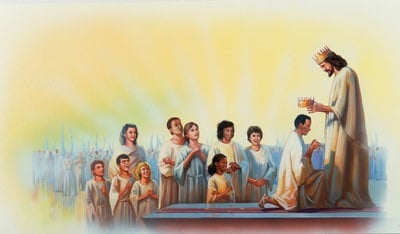Thursday: The Salvation of Sinners
Paul’s love for his own people is clearly apparent in Romans 11:25-27. How hard it must have been for him to have some of his countrymen fight against him and against the truth of the gospel.
And yet, amid it all, he still believed that many would see Jesus as the Messiah.
Read Romans 11:28-36. How does Paul show God’s love, not just for the Jews but for all humanity? How does he express here the amazing and mysterious power of God’s grace?
Through Romans 11:28-36, although a contrast is made between Jews and Gentiles, one point stands clear: God’s mercy and love and grace are poured out upon sinners. From even before the foundation of the world God’s plan was to save humanity and to use other human beings, nations even, as instruments in His hands to fulfill His divine will.
Carefully and prayerfully read Romans 11:31. What important point should we take from this text about our witness, not just to Jews but to all people with whom we come in contact?
No doubt, through the centuries, had the Christian church treated the Jews better, many more might have come to their Messiah. The great falling away in the early centuries after Christ, and the extreme paganization of Christianity – including the rejection of the seventh-day Sabbath in favor of Sunday – certainly didn’t make it any easier on a Jew who might have been drawn to Jesus.
How crucial, then, that all Christians, realizing the mercy that has been given to them in Jesus, display that mercy to others. We cannot be Christians if we do not (see Matt. 18:23-35).
| Is there someone to whom you need to show mercy, who perhaps doesn’t deserve it? Why not show this person that mercy, no matter how hard that might be to do? Isn’t that what Jesus has done for us? |


How doubly difficult for Paul who saw himself before his Damascus road experience, in his fellow Jews who were doing only what he had done himself.
I remember once I heard it said that the way to know when the sun had risen and you could call it day, was when it was light enough to look at your neighbor and recognise he was your brother.
Paul knew it was only through the grace and mercy of Jesus that he was no longer persecuting the church himself. He could look at his fellow Jews, and see himself in his brothers.
When you see yourself in those that oppose you and call themselves your enemy, it is then that you know that it is the light, not of yourself, but a gift of God, that awakens in you the knowledge that “there, but for the Grace of God, go I”.
Then, you have true compassion and can love your neighbor as yourself, as Paul did with his fellow Jews.
Let’s extend the grace we have received to others, so God can save others through us instead of in spite of us.
Sharing Mercy and Grace With Others by William Earnhardt
It is key that we not only understand grace but also live a of life of grace as christians and witnesses of Christ[Matt 28:18-20].If this is done,many will give their lives to Christ and will have a little heaven down here.
We cannot be Christians if we do not forgive. Show mercy even to those who you disagree with. Maybe sometimes all we can do is to be moons reflecting the Sun. Revelation 12:1
It is interesting how the parable of the “talents,” is in two Gospels but somewhat different in each of them. The one in Matthew 25:15 just indicates that a man travels on a journey and gives his three servants talents to one he gives 5, another 2 and another one and when he returns he rewards the two that have multiplied their talents and casts into darkness the one that hid his one talent. The one in Luke 19:12 shows the man traveling that he goes to receive a Kingdom and gives one pound to each of 10 servants and he gets flack from some that did not want him to rule in the Kingdom he was going to receive but goes and becomes King of that Kingdom and returns again and rewards those of the 10 servants that have multiplied their pound and only destroys the ones that did not want him to rule in the kingdom that he went to receive and did become king there but says nothing about destroying any of the 10 servants that did not multiply their pound.
I venture to say that Matthews’ parable of the talents probably applied to the Jews as a nation. And the one in Luke applies to the combined Jews and Gentiles of “True Christianity.”